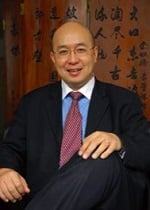 |
| WuXi PharmaTech CEO Ge Li |
China's WuXi PharmaTech ($WX) is in play after a furious year in which it expanded from lab, contract research and manufacturing services into genomics, e-commerce and clinical screening testing, highlighting a percolating scene in newer Asian pharma and biotech that sets the stage for dealmaking.
The plans include a major investment announced this year in a U.S. plant in Philadelphia designed for cell therapy products, including chimeric antigen receptor T cell (CAR-T) therapies.
The flurry of activity, including debt to finance the growth efforts, has raised questions of too fast, too far and a loss of focus on key pharma and biologics customers. It also prompts a look at other dealmaking in Asia over the past few years.
The company's CEO, Ge Li, and Ally Bridge Group Capital Partners say that a buyout would give the Chinese company's shareholders a 16.2% premium and is a square deal for potential value.
On April 30, Ge Li and ABG proposed buying all of the WuXi shares they don't already own for $46 each, valuing the company at roughly $2.8 billion. ABG and Li, also the company's chairman, submitted a nonbinding proposal letter to WuXi's board.
WuXi closed at $43.17 on Thursday in the U.S. The company is certainly a high flier at home with a recent visit by Chinese Premier Li Keqiang to tour the Shanghai facilities posted on its website.
Li and ABG didn't provide a rationale for taking the company private but said that the CEO's involvement means that the board needs to take an independent view.
"We believe that the Acquisition will provide superior value to the Company's shareholders," the proposal letter said.
"We recognize that the Company's Board of Directors (the "Board") will evaluate the Acquisition independently before it can make its determination to endorse it. Given the involvement of the Chairman in the Acquisition, this Proposal contains the non-waivable condition that the Acquisition be approved by a properly constituted committee of independent directors and that the Acquisition be approved by the requisite majority of those shareholders that are not members of the Consortium."
Several China drug and device firms that listed in the U.S. have subsequently moved to delist. Speculation that China's largest medical device maker, U.S.-listed Mindray ($MR), is also mulling a deal to be taken private.
In 2012, ShangPharma and 3SBio moved to delist from the U.S. and go private. In 2013, Simcere Pharmaceuticals made its move to go private with an offer from the chairman.
However, this year 3SBio has filed with the Hong Kong Stock Exchange (HKEx) as a key step for an initial public offering that would see it listed again two years after it left the Nasdaq and went private under a $370 million deal done by a consortium led by CEO Jing Lou and investment firm Citic Private Equity.
Other China-based biotech companies such as BeiGene hope to eventually tap the U.S. market for a listing.
But there has also been a slight uptick in activity in Hong Kong across pharma-related companies.
Hong Kong-listed Hua Han Bio-Pharmaceutical Holdings said Wednesday it will raise HK$3.19 billion to HK$3.39 billion ($412 million to $437 million) from an open offer on the basis of one offer share for every two existing shares.
And in Taiwan, momentum as a biotech clinical trials hub in Asia remains strong, but valuations for listed biotech companies may not yet reflect a wide smart money view on eventual commercial prospects.
Elsewhere in the region, the listing of SanBio on the Tokyo exchange and a move by Australia-based Brandon Capital Partners to raise A$200 million--with more possible from the country's major pension funds--has raised interest in Asia-related biotech firms.
- here's the takeover proposal release
- and the release about Chinese Premier Li Keqiang's visit
- for the date of the upcoming earnings release